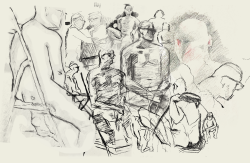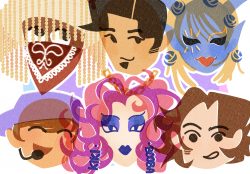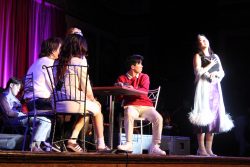15-year-old Terrie Jackson had a problem: he wanted to go to Anacostia Library with his younger brother Joshua on a Saturday afternoon to play computer games. But the route from Jackson’s home to the library lies in territory controlled by Choppa City, a rival gang beefing with the Oi Boys—a gang Jackson briefly belonged to.


“They’ll beat you up and go in your pockets,” he said, admitting that the two gangs didn’t seem to be warring that day. When his mother moved the Jackson family to Anacostia a year ago, she said they needed to buy a BB gun to protect themselves. Since then, they’ve experienced the realities of life in an Anacostia project—Terrie has worked as a drug courier, and Joshua knows how to lace cigarettes with crack cocaine.
Anacostia really is the kind of place where a teenager needs to factor gang warfare into a trip to the library. The area bears the brunt of Washington’s poverty—a 2000 study by the Brookings Institution found that four in ten people in Washington’s poor neighborhoods lived below the poverty line, and most of them were east of the Anacostia River. But Anacostia is changing—its residents are faced with rising gentrification, and they might not all remain when the change is complete.
With a sweater knotted at her neck, a ready smile and an Obama ‘08 sign in her window, Catherine Buell (LAW ‘04) presents a softer image of Anacostia than the one Terrie Jackson knows. Raised in Maryland, she moved to Anacostia in 2005 despite protests from her family.
“I wanted something with some history, some life to it,” she said. “I like the fact that I recognize my neighbors.” Sitting on a neighbor’s stoop while he gardened, Buell waved at every passerby, insistent on imposing a sense of neighborliness.


“There’s this movement of happy people in the neighborhood, but we don’t get reported on,” she said.
Buell is part of a wave of young homeowners drawn to Anacostia’s low property values. While she found rents elsewhere in the city too high for her, she owns two adjacent houses in Anacostia. Still, Buell’s attempts to put a friendly face on Anacostia have had setbacks. Driving into the neighborhood for one of the first times, Buell thought she saw “Chocolate City,” a nickname for D.C., spray-painted on a sign. Her delight changed to anxiety when she discovered the graffiti actually said “Choppa City,” the gang that earned its moniker from firing guns that sound like helicopters.
Although she’s better off than other Anacostia residents, Buell shares a distrust of city services, which she said ignore Anacostia in favor of wealthier wards.
“When you say you’re from Ward 8 they already put you in the bottom of the pile,” she said.
Buell also knows the crime that affects all Anacostia residents regardless of education level. After she moved in, teenagers robbed her in front of her house. The crime not only shook her faith in the neighborhood, but could put her property investment at risk too. The clear glass door in front of her house has a huge crack in it, and vacant properties—which offer a haven for the homeless and drive down property values—dot Buell’s block. Buell said one of her friends found homeless men living in a house she had just bought in Anacostia. Before she made them leave, the men took her on a tour of her new home.


Buell can be just as annoyed by the houses with people in them.
“I’m tired of all the affordable housing going in Ward 8,” she said. Buell wants more affordable housing units in other, more affluent wards. She noted, though, that at least a few of the “riff-raff” have left the neighborhood.
Buell is just as disappointed with the neighborhood’s food options. A Jamaican restaurant, the Fireside Restaurant, found too little demand and began keeping odd hours, while the restaurants that fare better on Martin Luther King Avenue, one of Anacostia’s main streets and a block from Buell’s house, are carry-outs or serve food she considers substandard.
Cole’s Cafe is one of the restaurants Buell wishes Anacostia would do without. Cole’s is run by Evangeline “Mama” Cole-Thompson, a woman given to saying “amen” when she approves of something and hugging strangers. The restaurant has a simple set-up: cold hunks of meat, like turkey wings and barbeque chicken, lie in basins. After getting an order, Cole-Thompson warms the food in a microwave.
While Buell thinks the food at Cole’s Cafe leaves much to be desired, some consider Cole-Thompson an Anacostia matriarch.
“This place is like a mecca for the neighborhood,” Gloria Lessington, a restaurant regular, said. “Mama Cole will call me and say someone needs some kind of help.” After getting a call from Cole-Thompson about an abused woman, Lessington said she was able to find the woman a shelter. The restaurant has also served some of Washington’s most powerful politicians—former Mayor Marion Barry (D) eats there, as do current Mayor Adrian Fenty (D) and At-Large Councilman Kwame Brown (D).
For all its neighborhood prominence, the restaurant totters on the brink of insolvency.
“We’re still in the red,” Cole-Thompson said. The restaurant’s financial problems are compounded by medical bills from her husband’s stroke and her fondness for giving away food. Still, favoring the bottom line over Anacostia’s destitute would be hard.
“That’s why I don’t have no money,” she said, “because I’m always feeding somebody.”


For all the problems she has running her restaurant, Cole-Thompson is happy to be in Anacostia.
“This is a wonderful place to live, to work,” she said. “I wouldn’t live anywhere else.”
Sam Boyd, Cole-Thompson’s cook, couldn’t disagree with her more. After living in Virginia and Maryland, he came to Anacostia for a woman. Now he works 14 hours a day to get out.
“I can’t stand Anacostia,” he said. Boyd has been mugged coming out of the restaurant, and says people are less respectful in Anacostia than in Virginia’s Shenandoah Valley, where he lived for several years.
After eight in the evening, the neighborhood is transformed, according to Boyd.
“It’s a whole different set of people,” he said. The different set of people Boyd means—drug addicts and dealers, gang members—don’t hang out in Cole’s Cafe, but the restaurant is not immune to their predations. It’s been robbed multiple times, despite its shaky finances.
Across from Mama Cole’s, a building Lessington said was burned down in the 1968 riots after Martin Luther King Jr.’s death lies in long-cold ashes. A loose piece of wood over a window reveals a saw horse, a tool intended for an abandoned renovation. The fenced-in concrete lot next door is filled with the detritus of life in the neighborhood: a bottle of MD 20/20, a packet of cigarettes. For all the trash, though, there are no people.


The vacant lot is not unique in its desolation—Cole’s Cafe is one of the few signs of life on Martin Luther King Avenue on Saturday afternoon. Across the river, stores on M Street are opening, but here, a florist and the Fireside Restaurant are both closed. A sign on American Furniture’s cracked glass window says the store is temporarily closed because of robberies.
One business is running, though, even if it doesn’t have a storefront. A block from Cole’s Cafe, Jim Benbow runs a bazaar out of his white van, selling products ranging from the mundane (sodas in a cooler) to the strange (brightly-colored packs of men’s undershirts) to off-brand (dark perfumes and oils in identical bottles).
“Out here, you’re blending with the people,” Benbow said, explaining why he hasn’t opened a store despite having a vending license since he was 19. In between transactions, Benbow talked with one customer about a friend’s funeral and teased a boy because his cousin didn’t know what drink he wanted. A woman going into a nearby building stopped to give him a hug.
There’s a reason street vendors sell out of their cars in Anacostia and not in, say, Georgetown. For many Anacostia residents, convenience stores are the only places to get essentials, according to Lessington. Convenience stores aren’t set up to sell clothes, though, and often overcharge. This lack of competition benefits street vendors like Benbow.
“The quality we bring out here is sometimes greater than the quality in the stores,” Benbow said after selling a woman baby socks.
Benbow said he has avoided the crime that plagued Cole’s Cafe and American Furniture. He attributes his good luck to a reputation in the neighborhood and a carefree attitude about his own property. If a would-be thief wants something Benbow is selling but can’t afford it, he said he’ll give it away for free or for a vague promise to pay him back later. Hungry larcenists get Benbow’s card, which will get them a free meal at the Fireside Restaurant or Cole’s Cafe. Benbow pays their bill later.
Besides deterring theft, his open-air business allows Benbow to talk politics.
“You can talk to people, [even if you] don’t always agree with them,” Benbow said. He passed the time waiting for more customers by talking with a man about immigration.
Benbow’s interest in politics isn’t all talk, though—he hopes to someday run for City Council and bring more services to the ward. His motto for Anacostia is “more”—more police equipment, more street sweeping, more affordable housing. The one thing he doesn’t want more of is the welfare office, the building he sets up in front of every day.
“I detest this place greatly,” he said. Benbow added that, as a councilmember, he would tell young people to stay in school instead of having children, a message he often dispenses from his outdoor pulpit.
Although Benbow wants to run for City Council, he said he would never run against the ward’s current councilman, former D.C. mayor Marion Barry (D). Barry always seems close at hand in Anacostia—in addition to eating at Cole’s Cafe, a customer of Benbow’s casually pointed out what he thought was Barry’s car driving by. Benbow himself considers Barry a friend, and a nearby poster about D.C. voting rights petrified onto a light pole trumpets “Free D.C.”—an early Barry slogan.
This omnipresence endears Barry to the ward, where he received his re-entry into District politics after serving a prison term for cocaine possession. While other Washingtonians remember him for rampant corruption during his mayoral term, and for infamously saying “bitch set me up” after he was caught smoking crack on tape, Ward 8 residents seem most fond of the summer job programs he provides.
“What he did to himself, he didn’t do to the people,” Cole-Thompson said. Even neighborhood newcomer Buell said she’d vote for him in the next election, and credits his more than 30 years of experience with D.C. government as a force for good in the government on Anacostia’s behalf.
Just as the neighborhood did what many considered impossible by giving ex-con Barry a second chance, it goes against the grain in its opinion of current D.C. mayor Adrian Fenty. Exuberance over Fenty’s victory in the mayoral election has soured in Anacostia, where the Mayor was booed during a Barry-sponsored Martin Luther King parade last weekend.
“He’s lied to a lot of people,” Benbow, who plans to work on Barry’s re-election campaign. He refused to elaborate, perhaps thinking of his political career, or Barry’s. Anacostia’s anger at Fenty may grow from his plans to close 23 Washington schools, including four in Anacostia.
On the other side of the river, the new Nationals Stadium has sparked a wave of gentrification in its Near Southeast neighborhood, replacing auto body shops and strip bars with condos and a new Department of Transportation office. Fans in the stadium’s nosebleed section can see Anacostia from their seats, and the high real estate values may someday spread across the river.
While a rush of real estate investment would break Choppa City’s control over the route to the library and bring in more businesses, it’s unlikely that a restaurant like Cole’s Cafe, with its microwave cooking, or a street vendor like Jim Benbow could survive in a more competitive environment. They might not even be able to afford living in the neighborhood anymore, although Buell insists no one will be “forced out” by high real estate values.
Boyd, the cook from the Shenandoah Valley, knows things will get better in Anacostia.
“I like the fact that it’s changing. Slowly but surely it’s changing,” he said. Then again, he can’t wait to leave.





I live in Anacostia and I think you really captured the spirit of the oldies and newbies. The Buell lady is correct, the community is friendly with great housing stock. However, I also empathize with the business community who deal with people who are addicted to social services. It is a strange mix. We will see what the future holds. Great Article!